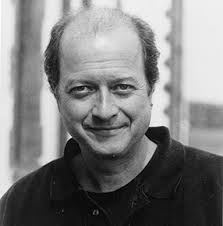
We talked to Sherod Santos about his play “Between Two Nevermores,” his experimental writing style, and his advice to young writers.
What was your inspiration for this play?
As a poet, I’m of course drawn to what is, in essence, the formative story of poetry and poets. It’s a story that evokes poetry’s deep-seated link to love and death and the erotic and, at the same time, its kinship with secrecy. In poetry as in plays, what isn’t said is always as important as what is. That’s a pretty heady combination of energies, and I was, as you say, inspired by the prospect of reimagining them.
What do you want the audience to come away with?
First and foremost, I’m only interested in “lived” experience, not in “literature” and “literary traditions.” I think the worst that could happen would be for an audience to feel compelled to interpret the play or to fix it in some scholarly context–the boneyard of the arts. My hope, in fact, is that that the audience would enjoy the play without knowing anything about the myth itself.
Can you discuss your choice to experiment with traditional play formatting with this script (i.e. leaving out character names)?
I wish I could say that I had even the vaguest sense of what I was doing in the early stages of writing, but I simply struck a small match in a very large cave, and it seemed to take forever to find my way. At times I felt like I was writing a play in verse, at others like I was writing a poem in dramatic form, and in each case, I was unhappy with the either/or nature of that relationship. In your example, the conventions for formatting a script kept chopping up the poetry; at the same time, the continuities of a traditional poetic form kept redirecting the discontinuities between characters. What I wanted to be a form that accommodated, on equal terms, both of those impulses.
What writers inspire you?
I’m afraid my reading is hopelessly unsystematic, and so far as I can tell it hasn’t over time shown any special loyalty to any particular genre or period set of authors. I’ve always believed that the books we need most find us, not the other way around. Certainly, much that has been meaningful to me I’ve discovered largely by accident, stumbling on one book while looking for another. That’s the most compelling reason I can think of for preserving our used bookstores and libraries. In my experience, for what it’s worth, wandering aimlessly along dusty bookshelves shelves can lead to profoundly personal discoveries.
What advice do you have for writers starting out?
Look closely, listen closely, read closely, take it all in. Then work, work, work until you move beyond the difficulty of the work to a love for the difficulty. In my opinion, only then are you truly prepared to turn inspiration into art. Oh, and one other thing: don’t think you’re a genius.
Poet, playwright, and translator, Sherod Santos is the author of six books of poetry, most recently “The Intricated Soul: New and Selected Poems.” In 2005 he published “Greek Lyric Poetry: A New Translation,” for which he received the Umhoefer Prize in Translation. Mr. Santos has received fellowships from the Ingram Merrill Foundation, the Guggenheim Foundation and the National Endowment for the Arts.
In 1999 he received an Award for Literary Excellence from the American Academy of Arts and Letters. Productions of his plays include 10-minute play, “Star,” Algonquin Theatre, New York City, 2010; one-act play, “Coffee Shop,” The Flint Michigan Play Festival, 2010; full-length play, “Lives of the Pigeons,” The Side Project, Chicago, 2013; two-minute play, “Beginning of the Revolution,” Royal Court Theatre: “Grit,” 2015.
His work has also appeared in literary journals and magazines including The Antioch Review, The New Yorker, The Paris Review, The Nation, Poetry, The Yale Poetry Review, The American Poetry Review, The New York Times Book Review, The Kenyon Review, and Parnassus Books. His book, “The Pilot Star Elegies,” was a finalist for the 1999 National Book Award and he is a recipient of The Pushcart Prize.
